人教版新目标九年级英语全册学案和教学设计Word版
【精品】人教版新目标初三英语全册教案
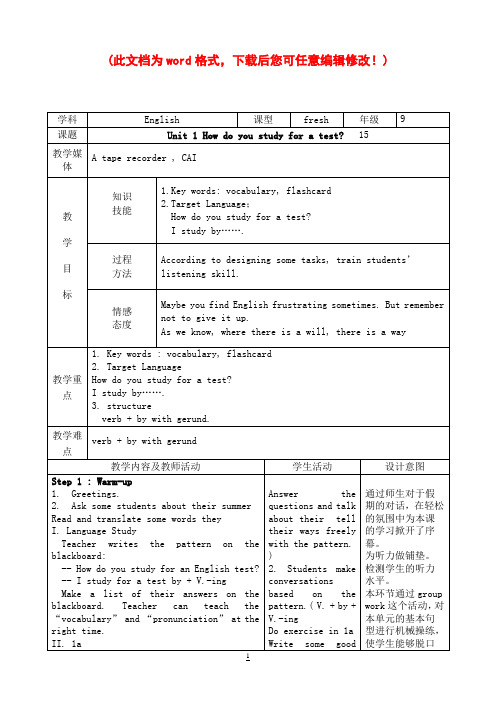
2. Ask some pairs to present their conversations.
(此文档为word格式,下载后您可任意编辑修改!)
学科
English
课型
fresh
年级
9
课题
Unit 1 How do you study for a test?15
教学媒体
A tape recorder , CAI
教
学
目
标
知识
技能
1.Key words: vocabulary,flashcard
2.Target Language;
II. ter checking, read the ways to the students and ask students to put up their other ways they study for an English test. Then ask some to read their ways to the class.
verb + by with gerund.
教学难点
verb + by with gerund
教学内容及教师活动
学生活动
设计意图
Step 1 : Warm-up
1. Greetings.
2. Ask some students about their summer
Read and translate some words they
【人教新目标】2019年秋季九年级英语:全一册英文版教案(179页,Word版)
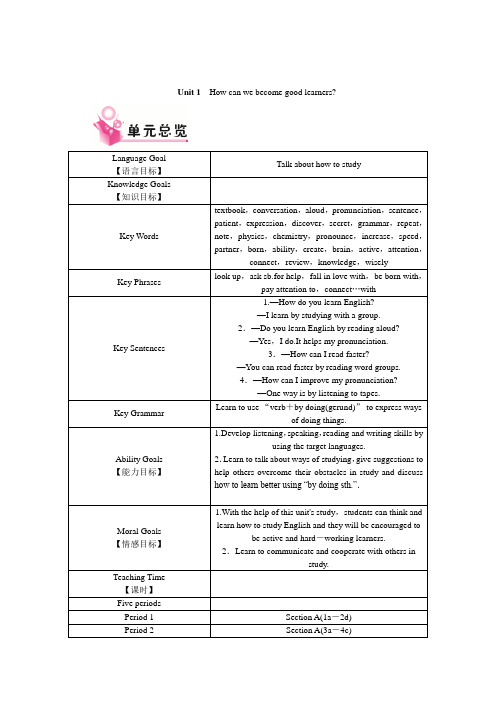
Unit 1How can we become good learners?Language Goal【语言目标】Talk about how to study Knowledge Goals【知识目标】Key Words textbook,conversation,aloud,pronunciation,sentence,patient,expression,discover,secret,grammar,repeat,note,physics,chemistry,pronounce,increase,speed,partner,born,ability,create,brain,active,attention,connect,review,knowledge,wiselyKey Phrases look up,ask sb.for help,fall in love with,be born with,pay attention to,connect…withKey Sentences1.—How do you learn English?—I learn by studying with a group. 2.—Do you learn English by reading aloud?—Yes,I do.It helps my pronunciation.3.—How can I read faster?—You can read faster by reading word groups. 4.—How can I improve my pronunciation?—One way is by listening to tapes.Key Grammar Learn to use “verb+by doing(gerund)” to express waysof doing things.Ability Goals 【能力目标】1.Develop listening,speaking,reading and writing skills byusing the target languages.2.Learn to talk about ways of studying,give suggestions to help others overcome their obstacles in study and discuss how to learn better using “by doing sth.”.Moral Goals 【情感目标】1.With the help of this unit's study,students can think and learn how to study English and they will be encouraged to be active and hard-working learners. 2.Learn to communicate and cooperate with others instudy.Teaching Time【课时】Five periodsPeriod 1 Section A(1a-2d) Period 2 Section A(3a-4c)Period 3 Section B(1a-1e)Period 4 Section B(2a-2e)Period 5 Section B(3a-3b) & Self Check本单元围绕学习的话题,讲述了学习的障碍及对应的解决方法,对学生的学习有重要意义。
人教版九年级全册英语教案教学设计(2023最新精编版)

人教版九年级全册英语教案教学设计(2023最新精编版)人教版九年级全册英语教案教学设计(2023最新精编版)简介本教学设计针对人教版九年级全册英语教材,旨在提供适用于2023最新精编版的教案教学设计。
以下是各单元的简要内容和教学建议。
Unit 1: Getting to Know Each Other- 主题介绍:本单元主要讲述认识新同学以及介绍自己的内容。
- 教学建议:利用课堂互动活动,帮助学生积极参与,加深对彼此的了解。
- 主题介绍:本单元主要讲述人际交往和沟通的重要性。
- 教学建议:通过个人经验分享和角色扮演活动,引导学生学会有效沟通和倾听。
Unit 3: Daily Routines- 主题介绍:本单元主要讲述日常生活中的各种活动和惯。
- 教学建议:设计情景对话和小组讨论,培养学生描述日常活动的能力。
Unit 4: Health and Fitness- 主题介绍:本单元主要讲述健康和健身的知识。
- 教学建议:通过小组活动和问卷调查,引导学生关注自身健康并形成良好惯。
Unit 5: Nature and Environment- 主题介绍:本单元主要讲述自然和环境保护的重要性。
- 教学建议:运用多媒体资源展示自然景观和环境问题,激发学生的环保意识。
Unit 6: Customs and Traditions- 主题介绍:本单元主要讲述各种俗和传统文化。
- 教学建议:组织学生进行小组研究,了解不同文化背景下的俗和传统。
总结本文档提供了一个适用于人教版九年级全册英语教材的教案教学设计。
通过设计灵活多样的教学活动,旨在培养学生的语言表达能力和综合运用能力,使学生对英语研究更感兴趣和自信。
*请注意,具体的教学内容和教学活动可以根据教师实际情况进行适当调整和创新。
*。
人教新目标九年级英语全一册Unit1period4教学设计

(二)讲授新知(500字)
1.教师带领学生回顾一般现在时和一般过去时的用法,为新句型的学习打下基础。
2.引导学生自主阅读课文,让学生关注重点词汇、短语和目标句型。
3.教师针对重点知识进行讲解,如“achieve”, “goal”, “dream”, “work hard”, “never give up”等词汇和短语,以及一般现在时和一般过去时的运用。
②提高作业:运用所学句型和时态,编写一段关于个人梦想的对话;
③拓展作业:采访家人或朋友,了解他们的梦想,并记录下来。
7.教学评价:采用形成性评价和终结性评价相结合的方式,关注学生在学习过程中的表现,全面评估学生的学习成果。
8.家校合作:与家长保持沟通,共同关注学生的学习状况和心理健康,为学生营造良好的学习环境。
四、教学内容与过程
(一)导入新课(500字)
1.教师通过多媒体展示一组励志图片和视频,内容包括宇航员、科学家、艺术家等不同职业的人物,以及他们为实现梦想而努力奋斗的场景。
2.邀请学生分享他们对这些图片和视频的感想,引导学生关注梦想的重要性。
3.教师提出问题:“What's your dream? How do you plan to achieve your dream?”让学生思考并准备回答。
难点:学生在实际语境中灵活运用所学知识,如词汇、语法和句型,实现信息的有效传递和交流。
2.重点:培养学生阅读理解能力,能够通过分析课文,总结文章大意,提炼关键信息。
难点:学生能够将阅读技巧应用于其他类似文章的阅读,提高阅读效率。
3.重点:激发学生的梦想,培养他们为实现梦想而努力奋斗的精神。
难点:引导学生正确面对困难,具备克服挫折、勇往直前的品质。
(人教新目标)2019年秋季九年级英语:全一册英文版教案(179页,word版)AUwqKA
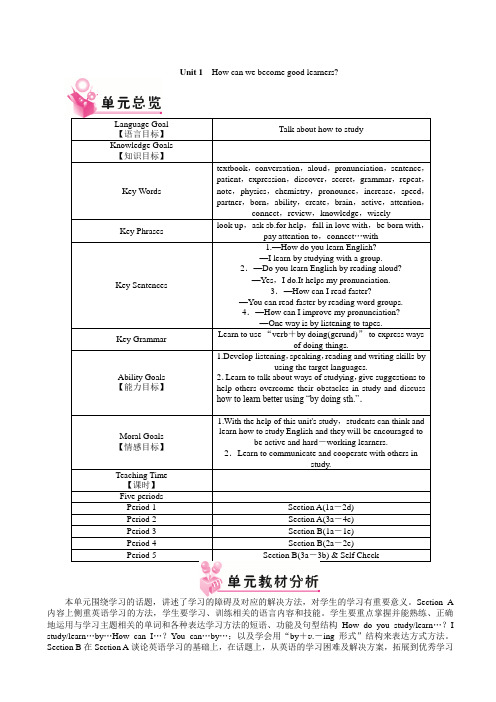
Unit 1How can we become good learners?Language Goal【语言目标】Talk about how to studyKnowledge Goals【知识目标】Key Wordstextbook,conversation,aloud,pronunciation,sentence,patient,expression,discover,secret,grammar,repeat,note,physics,chemistry,pronounce,increase,speed,partner,born,ability,create,brain,active,attention,connect,review,knowledge,wiselyKey Phraseslook up,ask sb.for help,fall in love with,be born with,pay attention to,connect…withKey Sentences1.—How do you learn English?—I learn by studying with a group.2.—Do you learn English by reading aloud?—Yes,I do.It helps my pronunciation.3.—How can I read faster?—You can read faster by reading word groups.4.—How can I improve my pronunciation?—One way is by listening to tapes.Key GrammarLearn to use “verb+by doing(gerund)” to express waysof doing things.Ability Goals【能力目标】1.Develop listening,speaking,reading and writing skills byusing the target languages.2.Learn to talk about ways of studying,give suggestions tohelp others overcome their obstacles in study and discusshow to learn better using “by doing sth.”.Moral Goals【情感目标】1.With the help of this unit's study,students can think andlearn how to study English and they will be encouraged tobe active and hard-working learners.2.Learn to communicate and cooperate with others instudy.Teaching Time【课时】Five periodsPeriod 1 Section A(1a-2d)Period 2 Section A(3a-4c)Period 3 Section B(1a-1e)Period 4 Section B(2a-2e)Period 5 Section B(3a-3b) & Self Check本单元围绕学习的话题,讲述了学习的障碍及对应的解决方法,对学生的学习有重要意义。
人教版新目标九年级英语全册教学设计及学案

人教版新目标九年级英语全册教学设计及学案九年级英语学案及教学设计目录unit1howdoyoustudyforatest?..................................................1sectiona..................................................................... ..................................1unit2iusedtobeafraidofthedark.............. ....................................14unit3teenagersshouldbeallowedtochoosethe irownclothes..........26unit4whatwouldyoudo?.................................. ...................................30unit5―unit7unit5itmustbelongtocarla..... ..................................36unit6ilikemusicthaticandanceto............ .......................................54unit7wherewouldyouliketovisit?...... ...............................................72unit8i‘llhelpcleanupthecityp arks...............................................88unit9whenwasitinvented?.. .........................................................107unit10bythetimeigo toutside,thebushadalreadyleft (127)第1单元你是如何学习考试的一、教学目标1.语言目标1)询问他人学习方法2)学习讨论各种学习方法和策略,学会评价各种学习方法的优劣2、知识目标1)howdoyoustudyforatest?istudybyving.2)做某事的方式做某事的方式3、能力目标1)通过讨论找到适合自己的学习方法,找出自己在英语学习中的困难2)学会给出关于学习方法的建议二、重点知识1、重点单词犯错误避免快乐地做令人不快的事情和直言不讳的英语做事情,这样的查找使词汇列表符合基本要求:能够读、写和使用。
【人教新目标】2019年秋季九年级英语:全一册英文版教案(179页,Word版)
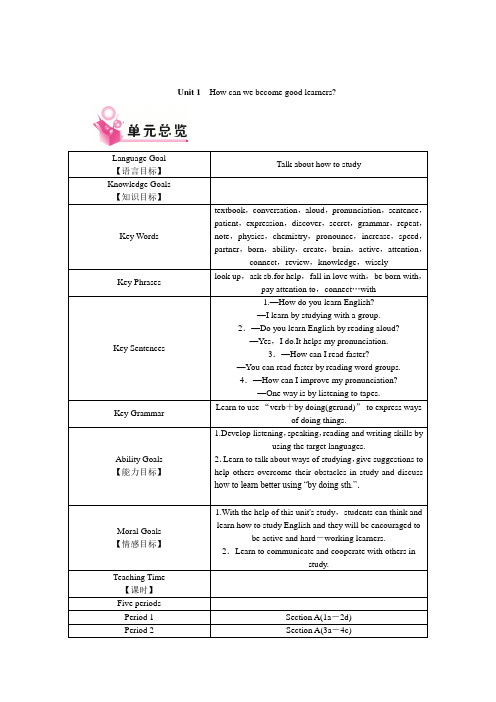
Unit 1How can we become good learners?Language Goal【语言目标】Talk about how to study Knowledge Goals【知识目标】Key Words textbook,conversation,aloud,pronunciation,sentence,patient,expression,discover,secret,grammar,repeat,note,physics,chemistry,pronounce,increase,speed,partner,born,ability,create,brain,active,attention,connect,review,knowledge,wiselyKey Phrases look up,ask sb.for help,fall in love with,be born with,pay attention to,connect…withKey Sentences1.—How do you learn English?—I learn by studying with a group. 2.—Do you learn English by reading aloud?—Yes,I do.It helps my pronunciation.3.—How can I read faster?—You can read faster by reading word groups. 4.—How can I improve my pronunciation?—One way is by listening to tapes.Key Grammar Learn to use “verb+by doing(gerund)” to express waysof doing things.Ability Goals 【能力目标】1.Develop listening,speaking,reading and writing skills byusing the target languages.2.Learn to talk about ways of studying,give suggestions to help others overcome their obstacles in study and discuss how to learn better using “by doing sth.”.Moral Goals 【情感目标】1.With the help of this unit's study,students can think and learn how to study English and they will be encouraged to be active and hard-working learners. 2.Learn to communicate and cooperate with others instudy.Teaching Time【课时】Five periodsPeriod 1 Section A(1a-2d) Period 2 Section A(3a-4c)Period 3 Section B(1a-1e)Period 4 Section B(2a-2e)Period 5 Section B(3a-3b) & Self Check本单元围绕学习的话题,讲述了学习的障碍及对应的解决方法,对学生的学习有重要意义。
最新人教新目标九年级英语全一册学案(全册 共140页)

最新人教新目标九年级英语全一册学案(全册共140页)目录Unit 1 How can we become good learners?Unit 2 I think that moon-cakes are delicious.Unit 3 Could you tell me where the restroom are?Unit 4 I used to be afraid of the dark.Unit 5 What are the shirts made of?Unit 6 When was it invented?Unit 7 Teenager should be allowed to choose their own clothes. Unit 8 It must belong to Carla.Unit 9 I like music that I can dance to.Unit 10 You’re supposed to shake hands.Unit 11 Sad movies make me cry.Unit 12Life is full of the unexpected.Unit 13 We’re trying to save the earth.Unit 14 I remember meeting all of you in Grade 7.Unit 1 How can we become good learners?【学习内容】Unit 1 How can we become good learners? Section A 1a-2d ( Period 1 )【学习目标】1.掌握重点单词和短语:textbook; conversation; aloud; pronunciation; sentence; patient; study with a group; have conversations with; read aloud; give a report等。
人教新目标版九年级英语全册全一册教案
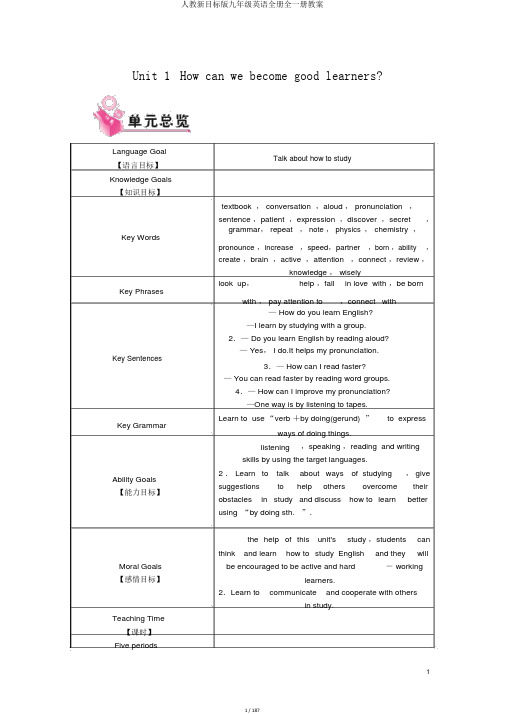
Unit 1 How can we become good learners?Language GoalTalk about how to study【语言目标】Knowledge Goals【知识目标】textbook , conversation ,aloud , pronunciation ,sentence ,patient ,expression ,discover ,secret ,grammar, repeat , note , physics , chemistry ,Key Words,speed,partner ,born ,ability ,pronounce ,increasecreate ,brain ,active ,attention ,connect ,review ,knowledge , wiselylook up,help ,fall in love with ,be born Key Phrases,connect withwith , pay attention to— How do you learn English?—I learn by studying with a group.2.— Do you learn English by reading aloud?— Yes, I do.It helps my pronunciation.Key Sentences3.— How can I read faster?— You can read faster by reading word groups.4.— How can I improve my pronunciation?—One way is by listening to tapes.Learn to use “verb +by doing(gerund) ”to express Key Grammarways of doing things.listening ,speaking ,reading and writingskills by using the target languages.Ability Goals 2 . Learn to talk about ways of studying , give suggestions to help others overcome their【能力目标】obstacles in study and discuss how to learn betterusing “by doing sth. ”.the help of this unit's study ,students canthink and learn how to study English and they will Moral Goals be encouraged to be active and hard - working 【感情目标】learners.2.Learn to communicate and cooperate with othersin study.Teaching Time【课时】Five periodsPeriod 1 Section A(1a - 2d)Period 2 Section A(3a - 4c)Period 3 Section B(1a - 1e)Period 4 Section B(2a - 2e)Period 5 Section B(3a - 3b) & Self Check本单元环绕学习的话题,叙述了学习的阻碍及对应的解决方法,对学生的学习有重要意义。
人教版新目标九年级英语全册教案

Unit 1 How can we become goodlearners?Section APeriod 1 Section A (1a-2d)本单元围绕“做一个优秀的学习者”这一话题,首先引入了“I s tudy by working with a group.”这一重点句型,接下来学习how 引导的特殊疑问句及其答语和复习现在完成时态。
Section A 包含两个教学重点:其一要求学生学习、掌握“I study by working with a group.”这一重点句型,;其二,学习how 引导特殊疑问句及其答语。
Section B 是在Section A 基础上的拓展,主要是语言学习、运用和巩固阶段。
另外,本单元介绍了许多优秀的英语学习习惯与方法,可引导同学们借鉴采用。
【知识与能力目标】(1)熟练掌握下列词汇:aloud,pronunciation,discover,repeat, note,pronounce, increase,speed, partner, create, active, connect, review, knowledge, wisely, born, attention(2)熟练掌握下列短语: work with friends, ask the teacher for helpread aloud, look up, practice pronunciation, connect …with …, pay attention to(3)掌握下列句型:---How do you study English? --- I learn by working with a group.----Do you learn English by reading aloud? ----Yes, I do. It helps my pronunciation.----- How can I read faster? ----You can read faster by reading word groups.------How can I improve my pronunciation? ----One way is by listening to tapes.----But whether or not you can do this well depends on your learning habits【过程与方法目标】本单元的主题是谈论学习方法与习惯,可引导学生采用Listening for specific information ,◆教材分析◆教学目标Practicing, Role playing ,Reading 和Writing 等学习策略,学习一些新词汇,掌握一些重点句型,在小组合作学习的过程中,进一步促进学生对现在完成时态的理解和运用。
新目标九年级英语学案(Unit_1_-_15全册)(1)
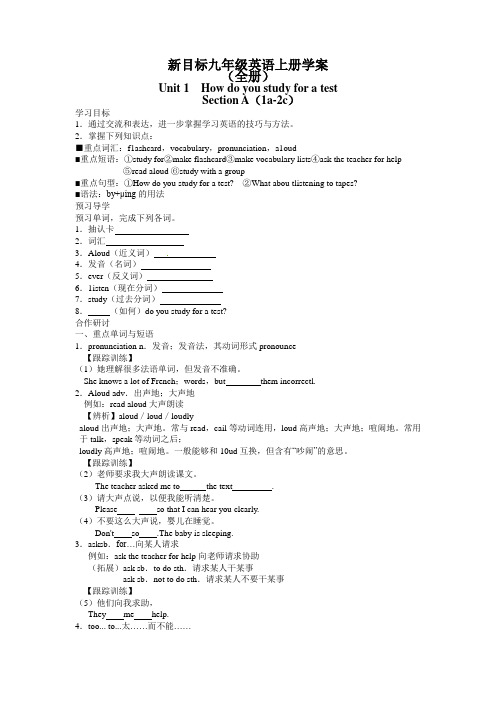
新目标九年级英语上册学案(全册)Unit 1 How do you study for a testSection A(1a-2c)学习目标1.通过交流和表达,进一步掌握学习英语的技巧与方法。
2.掌握下列知识点:■重点词汇:f1ashcard,vocabulary,pronunciation,a1oud■重点短语:①study for②make flashcard③make vocabulary lists④ask the teacher for help⑤read aloud ⑥study with a group■重点句型:①How do you study for a test? ②What abou tlistening to tapes?■语法:by+μing的用法预习导学预习单词,完成下列各词。
1.抽认卡2.词汇3.Aloud(近义词)4.发音(名词)5.ever(反义词)6.1isten(现在分词)7.study(过去分词)8.(如何)do you study for a test?合作研讨一、重点单词与短语1.pronunciation n.发音;发音法,其动词形式pronounce【跟踪训练】(1)她理解很多法语单词,但发音不准确。
She knows a lot of French;words,but them incorrectl.2.Aloud adv.出声地;大声地例如:read aloud大声朗读【辨析】aloud/loud/loudlyaloud出声地;大声地。
常与read,cail等动词连用,loud高声地;大声地;喧闹地。
常用于talk,speak等动词之后;loudly高声地;喧闹地。
一般能够和10ud互换,但含有“吵闹”的意思。
【跟踪训练】(2)老师要求我大声朗读课文。
The teacher asked me to the text .(3)请大声点说,以便我能听清楚。
(完整版)人教版新目标九年级英语全册学案及教学设计【经典】
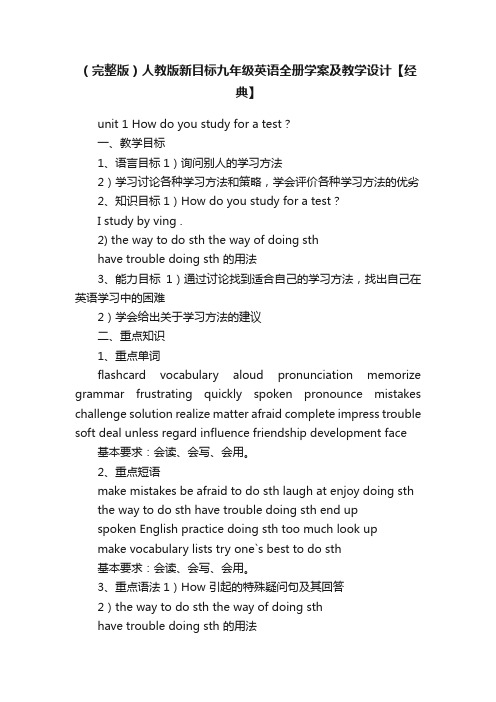
(完整版)人教版新目标九年级英语全册学案及教学设计【经典】unit 1 How do you study for a test?一、教学目标1、语言目标1)询问别人的学习方法2)学习讨论各种学习方法和策略,学会评价各种学习方法的优劣2、知识目标1)How do you study for a test?I study by ving .2) the way to do sth the way of doing sthhave trouble doing sth 的用法3、能力目标1)通过讨论找到适合自己的学习方法,找出自己在英语学习中的困难2)学会给出关于学习方法的建议二、重点知识1、重点单词flashcard vocabulary aloud pronunciation memorize grammar frustrating quickly spoken pronounce mistakes challenge solution realize matter afraid complete impress trouble soft deal unless regard influence friendship development face 基本要求:会读、会写、会用。
2、重点短语make mistakes be afraid to do sth laugh at enjoy doing sth the way to do sth have trouble doing sth end upspoken English practice doing sth too much look upmake vocabulary lists try one`s best to do sth基本要求:会读、会写、会用。
3、重点语法1)How 引起的特殊疑问句及其回答2)the way to do sth the way of doing sthhave trouble doing sth 的用法基本要求:理解其含义,学以致用。
人教新目标九年级英语全册Unit1SectionB教案教学设计

4.学生能够通过听力练习,提高获取关键信息的能力,并能够进行有效的信息筛选和整合。
5.学生能够运用所学知识,通过写作表达个人目标,并能够进行合理的论述和解释。
(二)过程与方法
1.通过小组讨论,培养学生的合作意识和团队精神,激发学生主动学习的兴趣。
五、作业布置
1.写作作业:要求学生结合课堂讨论的个人目标,撰写一篇不少于100词的英语短文,描述自己的短期和长期目标,并阐述为实现这些目标所采取的措施。此作业旨在巩固学生对本节课词汇和语法的掌握,并提高学生的写作能力。
提示:可以引导学生运用一般现在时和现在进行时描述目标及行动计划。
2.口语作业:学生分组,每组选择一个话题,如“如何克服困难实现目标”、“我的梦想之旅”等,进行角色扮演或小组讨论,并录制视频。要求每个学生都参与其中,展示自己的口语表达能力。
(三)情感态度与价值观
1.培养学生树立明确的学习目标,激发学生为实现目标而努力奋斗的信心和决心。
2.培养学生具备积极向上的心态,面对挑战时能够保持乐观,勇于克服困难。
3.通过学习他人的成功经验,引导学生学会欣赏他人,培养良好的团队合作精神。
4.培养学生具备责任感和自律性,明确自己的学习目标,并为实现目标付出努力。
2.利用问题引导法,引导学生思考个人目标的重要性,激发学生的学习动机。
3.运用任务型教学法,设计丰富的课堂活动,如小组竞赛、角色扮演等,让学生在实践中掌握知识。
4.通过阅读和听力训练,培养学生的批判性思维和逻辑推理能力。
5.创设真实的语境,让学师可选取与课堂话题相关的听力材料,帮助学生巩固所学知识。
5.课后反思:要求学生针对本节课的学习内容,进行自我反思,总结自己在目标设定和行动计划方面的收获,以及需要改进的地方。
人教新目标九年级英语:全一册英文版教案(179页,word版)
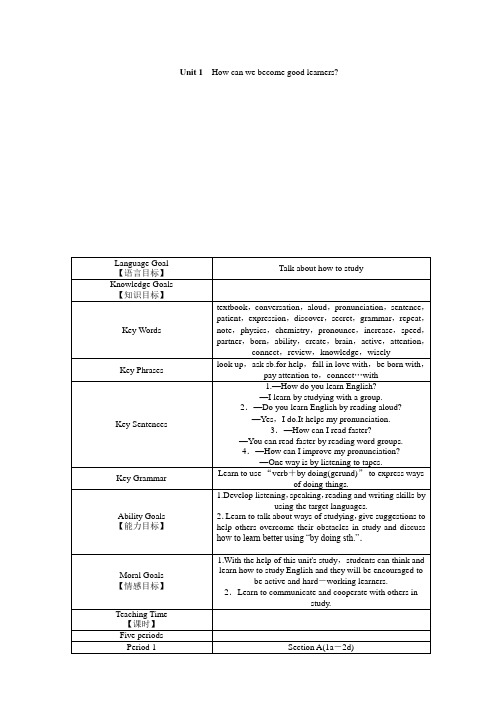
Unit 1How can we become good learners?本单元围绕学习的话题,讲述了学习的障碍及对应的解决方法,对学生的学习有重要意义。
Section A 内容上侧重英语学习的方法,学生要学习、训练相关的语言内容和技能。
学生要重点掌握并能熟练、正确地运用与学习主题相关的单词和各种表达学习方法的短语、功能及句型结构How do you study/learn…?I study/learn…by…How can I…?You can…by…;以及学会用“by+v.-ing形式”结构来表达方式方法。
Section B在Section A谈论英语学习的基础上,在话题上,从英语的学习困难及解决方案,拓展到优秀学习者的学习习惯;在语言上,巩固和丰富了与学习相关的话题词汇;在技能上,将听、说能力综合,突出阅读训练,由读促写;在策略上,引导学生关注优秀学生的学习方式,并借鉴运用;在情感上,鼓励学生面对困难,积极探索解决方案,不断改进学习方法,提高学习效率。
The First Period—Section A(1a-2d)Teaching Important Points【教学重点】Key words & phrases:aloud,pronunciation,sentence,patient;study for,ask the teacher for help,work with a group,be patientKey sentences:—I study by working with a group.2.—Does anyone learn English by watching videos?—No.It's too hard to understand spoken English.3.—Have you ever studied with a group?—Yes,I have.I've learned a lot that way.Key structure:eg:I study by working with a group.Teaching Difficult Points【教学难点】★Practice the structure “verb+by doing” in listening and speaking.Teaching Aids【教学工具】A tape recorder,CAI or multimedia courseware.Teaching Steps【教学过程】★Step 1Leading in【新课导入】(Ⅰ)1.GreetingGreet the class and briefly talk with the students about their holidays.2.DiscussingDiscuss with the students,like this:T:What do you usually do when you study English?S1:I often read English books.T:(To class) Good.He studies English by reading English books.That's a good way.(Then to another student)Now,what do you usually do when you study English?S2:I…3.Practice with more students.★Step 1Leading in【新课导入】(Ⅱ)1.GreetingGreet the class and tell the students the goal of this unit.2.PreparationT:Today we are going to talk about how to study.How do you study English?Collect the students' answers and prepare the language items for this period.★Step 2Cooperative inquiry【合作探究】1.Finish the task in 1a①Work in groups.Add more ways of studying English.②Read these phrases in 1a.Tell them the usage of “by doing” phrases.③Help students to say out their ways of studying.2.Finish the task in 1b①Read the instructions.②Play the recording for the first time.Students only listen.③Play the recording a second time.Ask them to match the ways with the names.④Check the answers with the whole class.3.Finish the task in 1c①In groups,interview their partners about how they study for a test.②One from each group reports to the class.4.Finish the tasks in 2a-2b①Use PPT or pictures for the students to learn the new words.Read the questions in 2a.②Get the students to guess the answers in 2b.③Play the recording for the first time.Students listen and check the questions.④Play the recording again.Students listen and match the answers with the questions in 1a.⑤Check the answers with the whole class.5.Finish the task in 2c①Show the pictures of the conversations.②Students work in pairs.③Ask three pairs to say out their conversations to the class.Show the PPT to help.6.Finish the task in 2d①Talk about the picture and scan the conversation.②Ask the students to read aloud the conversation in 2d.Learn the new words and phrases.③Ask these questions:How does Jack feel at the very start?What makes him feel like this(nervous)?What's Jack's problem when he reads?And what does Annie suggest?What's Jack's problem with words?And what's Annie's advice?④Check the answers with individual students to see how well they understand.⑤Play the recording and get the students to follow the teacher in the recording.Then ask two pairs to act out the conversation.★Step 3Homework1.Do a survey:How do you study for an English test?2.Imagine that you are Jack and Annie.Make a conversation to talk about your English study.3.Translate the following sentences into English.(1)你是怎样学习英语的?我通过大量阅读来学习。
初中-英语-人教新目标-九年级全册-教案

谓语动词时态专项练习学案【学习目标】通过本节课的学习,你能:1.基于对语篇的理解,针对语法(谓语动词时态)运用,完成专项练习。
2.通过实例能掌握解题技巧,在任务链的引导下,实现方法和技巧的迁移和运用,落实应用素养。
3.基于对东方和西方童话故事的理解,通过文化的碰撞,了解东西传统文化的精髓和内涵,了解文学作品中的主人翁精神,增强文化意识。
Step1: Leading-inShow students some pictures in Reading Salon. Lead students to read fairy tales. Salon begins.Step2: Listen and guess, read Chinese fairy tale book 1 (Journey to the West)1.Listen music and guess which book it is.2. Describe the HERO.(A) He can turn himself into different shapes. But unless he hides his tail, he cannot make himself a human.(B)He sometimes makes the stick even so small that he can put it in his ear.(C)He uses it to fight bad people.(D)The Monkey King has a magic stick.3. Compete the story.The Monkey King is the main character from the famous Chinese story Journey to the West. Children all over the world love the Monkey King, they 1______(take) him as a big hero. They think he is wonderful because he helps weak people when they have difficulties. The Monkey King has a magic stick. He 2_______(use) it to fight bad people.When the kids see the Money King on TV, they always shout:” Look!The Monkey King 3 __________(fight) bad people.” He sometimes makes the stick even so small that he can put it in his ear. He can turn himself into different shapes. But unless he 4______(hide) his tail, he cannot make himself a human. The Monkey King 5 __________(excite) the children in the coming years.观察与思考1观察1-5 空格处所填的单词,他们都是_______,在句子充当谓语成分。
2023年版人教新目标九年级英语上册全册教案

2023版人教新目旳九年级英语上册全册教案Uuld you please tell me ware?一、教学目旳:语言知识目旳基本词汇:amp, bard, pardon, wabaal, rush, suggest, staff, graal, mail, east, fascinating, convall, cllite, politely, speaker, request, ddirect, whom, address, underground基本句型:Excuse me, do you know where I can budicine?Sure. There’s a supermarket dowuld you please tell me how to g?I’m not sure how to gI wonder where we should go nexuld you tell us wband starts playing this evening?You should try that new ride ov2. 技能目旳: (1)能用宾语从句礼貌旳寻求协助。
(2)能用对旳旳措施指路。
情感目旳: 培养学生尊重他人,对人有礼貌,热爱生活。
二、教学重难点:教学重点:(1)礼貌旳向他人寻求协助。
(2)对旳使用宾语从句。
2. 教学难点:运用宾语从句礼貌旳寻求协助。
三、教学环节:A 1 (1a-2d)Warming –uGreeting2 Presenta(1)Guessing gaw pictuwhole claudent explalagl ish and awho doesn’t look at the blackboard guesses what plaFor exampludent say: We can savxchanglace, agua bank. Get studgulaces like babuseum, bawaall and(2)Showaudents andw:uld you tell me where I can buamps?uld you please tell me where I can get a dictionary?Do you know where I can gagazines?Pra)Match each thing with a plaure in 1a.2)Reada___ g___ gaga___ have d___ get a dictionary ___ gation abouwn___ buy a newspa___ bua___ get a paListeningListen and complversaure in 1a. Tanswers wwhole claPraake conversations usingaa. Then talk about your owFor example:A: Excuuld you please tell me how to gb?B: Sure, just go along Mauntil you paThe bur right, beside the baA: Thanks. Do you know wbloses today?B: It closes at 7:00day.A: Thank you!B: You’re welListeningListen and number the dder that you hea2a You will headbelow. Number the dder you hea___ Gbird fl___ Turn l___ Gd fl___ Turn rig___ The supermabetwlowand the b___ Go past the b2. Listen again. Show how the boy walupermarket. Drawa lure in 2a. Then gudent draw the lblackboard.3. Ld time and answer the qu) Excuan you tell me whereI can budicine?2) Do you know how to go there?3) OK, great. Oh, andg. Do you know wglght?4) OK, thanks a lPairwake conversations aboulaure in 2a.A: Excuan you tell me where I can buamps?B:’s agA: Do you know how to go there?B: Yes. Gd floor and turn right. Then go past the bank. Tbetween museum and library. You should be able to get staA: O K, great. Oh, andg. Do you know …B: I’m not sure, but you …A: OK, thanks a lB: You’re welReadingReadversa2d and answer the qu2. Role –plaversaxplain the languag2d.(1) Go along Mauntil you pa) until和 till同义为“直到……” ,till多用于口语,until可以放在句首,till则不能放在句首。
人教版新目标九年级全套英语教学设计

5.强化写作训练,让学生熟悉各类写作格式,注重文章结构的合理性和语言表达的准确性。通过以上措施,帮助学生全面提高英语素养,为今后的学习和生活打下坚实基础。
三、教学重难点和教学设想
(一)教学重难点
1.词汇和短语的掌握:本章节涉及的词汇和短语是学生进行有效交流的基础,但它们的记忆和运用对学生来说是一大挑战。
针对以上学情,我将结合人教版新目标九年级全套英语教材,注重以下几个方面进行教学:
1.扩大学生词汇量,通过丰富多样的词汇教学活动,帮助学生记忆和运用词汇。
2.加强语法知识的学习,通过实例分析和练习,让学生在实际语境中掌握语法规则。
3.提高学生的听力和口语表达能力,采用情境模拟、角色扮演等方法,激发学生的积极性。
2.语法结构的正确使用:时态、语态、被动语态等语法点的正确运用是学生表达思想的难点。
3.听力策略的培养:如何引导学生运用预测、关键词定位等策略提高听力理解能力,是教学中的重点。
4.口语表达能力的提升:学生在实际对话中往往存在思维跳跃、表达不连贯的问题,需要着重训练。
5.阅读理解的深度:培养学生从表层理解到深层理解的能力,能够对文章主旨、作者态度等进行准确把握。
3.培养学生的自信心,使他们相信自己能够克服困难,掌握英语这门国际通用语言。
4.培养学生的跨文化意识,使他们尊重和理解不同国家和地区的文化差异。
5.引导学生树立正确的价值观,将所学英语知识运用到实际生活中,为我国的社会发展做出贡献。
二、学情分析
九年级的学生已经具备了一定的英语基础,但在语言运用方面仍存在一定的困难。通过对学生的观察和了解,我发现他们在以下方面需要进一步指导和提高:
【K12学习】【人教版】新目标XX年九年级英语:全一册单元教案(Word版,179

【人教版】新目标XX年九年级英语:全一册单元教案(Word版,179Unit 1 How can we bexxe good learnersLanguage Goal 【语言目标】 Knowledge Goals 【知识目标】Talk about how to study textbook,conversation,aloud,pronunciation,sentence,patient,expression,discover,secret,grammar,repeat,note,physics,chemistry,pronounce,increase,speed,partner,born,ability,create,brain,active,attention,connect,review,knowledge,wisely look up,ask help,fall in love with,be born with,pay attention to,connect…with 1.—How do you learn English —I learn by studying with a group. 2.—Do you learn English by reading aloud —Yes,I helps my pronunciation. 3.—How can I read faster —You can read faster by reading word groups. 4.—How can I improve my pronunciation —One way is by listening to tapes. Learn to use “verb+by doing(gerund)”to express ways of doing things. listening,speaking,reading and writing skills by using the target languages. 2.Learn to talk about ways of studying,give suggestions to help others overxxe theirobstacles in study and discuss how to learn better using “by doing sth.”. the help of this unit's study,students can think and learn how to study English and they will be encouraged to be active and hard-working learners. 2.Learn to xxmunicate and cooperate with others in study. Section A(1a-2d) Section A(3a-4c)Key Words Key Phrases Key Sentences Key Grammar Ability Goals 【能力目标】 Moral Goals 【情感目标】Teaching Time 【课时】 Five periods Period 1 Period 2 Period 3 Period 4 Period 5 Section B(1a-1e) Section B(2a-2e) Section B(3a-3b) & Self Check本单元围绕学习的话题,讲述了学习的障碍及对应的解决方法,对学生的学习有重要意义。
- 1、下载文档前请自行甄别文档内容的完整性,平台不提供额外的编辑、内容补充、找答案等附加服务。
- 2、"仅部分预览"的文档,不可在线预览部分如存在完整性等问题,可反馈申请退款(可完整预览的文档不适用该条件!)。
- 3、如文档侵犯您的权益,请联系客服反馈,我们会尽快为您处理(人工客服工作时间:9:00-18:30)。
九年级英语整体教学设计unit 1 How do you study for a test?一、教学目标1、语言目标 1)询问别人的学习方法2)学习讨论各种学习方法和策略,学会评价各种学习方法的优劣2、知识目标 1)How do you study for a test?I study by ving .2) the way to do sth the way of doing sthhave trouble doing sth 的用法3、能力目标 1)通过讨论找到适合自己的学习方法,找出自己在英语学习中的困难2)学会给出关于学习方法的建议二、重点知识1、重点单词flashcard vocabulary aloud pronunciation memorize grammar frustrating quickly spoken pronounce mistakes challenge solution realize matter afraid complete impress trouble soft deal unless regard influence friendship development face 基本要求:会读、会写、会用。
2、重点短语make mistakes be afraid to do sth laugh at enjoy doing sththe way to do sth have trouble doing sth end upspoken English practice doing sth too much look upmake vocabulary lists try one`s best to do sth基本要求:会读、会写、会用。
3、重点语法 1)How 引起的特殊疑问句及其回答2)the way to do sth the way of doing sthhave trouble doing sth 的用法基本要求:理解其含义,学以致用。
三、导学案Section A● 例析导学1、They also have fun。
fun n. 乐趣,玩笑【拓展】 1)have fun 意为“过的快活”相当于enjoy oneself have a good time 例如:You are sure to have fun at the party 。
2)have fun doing sth 意为“开开心心做谋事”例如: The children are having fun playing this game .类似的结构还有have trouble /problems experience doing sth2、…and then end up speaking in Chinese .end up 结束,后接动词的v-ing形式end up with 以……结束,以……而告终例如: The game ended up with a song.【拓展】 end 作名词1.端,尖,末端,终点例如: the end of the year2.边缘;极点,极限例如:the end of the road3.结局,结果。
例如:the end of the story3、……joining the English club at school was the best way to improve her English . the best way to do sth 做谋事的最好方法【拓展】 1)way 方式 , 方法有两种用法the way to do sththe way of doing sth例如: This is the best way to solve the problem. 或 This is the best way of solving the problem.2)way 道路 the way to sw e g. on one’s way to 其中to 是介词后面跟表示地点的名词做宾语例如: He got lost and couldn’t find his way home.4、Do you ever practice conversations with your friends ?1) ever adv. 曾经【拓展】一般用于疑问句,否定句中,表示频率。
类似的词还有always ,usually ,often ,sometimes ,hardly ,ever ,never,用在行为动词之前,助动词之后。
2)practice n。
& v. 练习,实习,实践,practice doing sth. 练习干某事例如:He practices running every morning .5、I’ve learned a lot that way .a lot 很多,非常【拓展】1)在句中做主语例如:A lot has been done about it .2) 在句中做宾语例如: You have done a lot for him .3) 在句中做状语 ,且可修饰比较级例如: He feels a lot better today .4)a lot of 或 lots of 可修饰不可数名词和可数名词复数例如:There are lots of differences between them.6、She added that having conversations with friends was not helpful at all . add v. 增加 ,补充说 , 继续说【拓展】 1) add sth to sth. 添加 ,增加例如: If you add five to nine ,you will get fourteen .2)add up to 总计例如: These numbers add up to 177 .● 专项练习选择填空1.The boys are going to have fun ____the picture.A.drawB. to draw C drew D drawing2.I am sorry I took your umbrella _____ .A.because mistakeB.with mistake c.by mistake d.by mistakes3.Can’t you see Tom and Jim _____football?A.playingB. playC.to playD. played4. My English teacher was very angry ______Tom .A. atB.about c.with D.on5.His mother is strict _____.A.with himB.with heC.in himD.in he6. When we practice English speaking ,we shouldn’t end up ____in Chinese .A. speakB. speakingC. to speakingD. with speak7. Let’s go swimming if it ____hot tomorrow.A. will beB. would beC. isD. is going to be8. Taiwan is ____the est of China and _____the west of Fujian province .A.in;toB.to ;toC. on; toD. in; to●句析导学1.How do you study for a test? I study by listening to tapes.你怎样学习,准备应考?通过听录音。
How是用来提问“怎么,怎样”的疑问词,引导一个特殊疑问句,经常用by加动词的Ving 形式,表示“通过……方式,方法”或“借助某种手段”例如: How do you usually go to school ? I go to school by bus。
He makes a living by working on the farm。
2.What about listening to tapes?听录音怎么样?What about …?相当于How about…?后面可跟名词、代词或动词Ving形式。
常用来提出建议,征求意见或询问情况。
相类似句子有Why not +v…?Let‘s +v . Shall we +v ? You’d better +v.What abou /How about going boating with us ?3.It’s too hard to understand the voices .语音难以理解。
too +adj /adv +to do 表示”太……而不能……”,句中it是形式主语,真正主语是动词不定式。
可与so…that 和enough…to do sth 改写.例如: It’s too heavy for me to caryy the box.It isn’t light enough for me to carry the box.It’s so heavy that I can’t carry the box.4、…he finds watching movies frustrating because the people speak too quickly . watching movies 动名词做宾语,frustrating 形容词做宾语补足语find +宾语+形容词发现…… 例如: He finds English interesting.不定式做宾语时,用find it adj.for sb. to do sthHe found it difficult to pass the exam.● 专项练习1. Let the students make conversations about their own way of learning English, and how long he or she used it ,how he or she learns from it.2. Let the students ask and answer in pairs according to the learning way of 3a. Talk about their ways of learning English.● 教学设计本节课以英语学习为话题,重点是介绍英语学习的方法,Section A 就是紧紧围绕该话题,以听说方式展开学习运用的。
